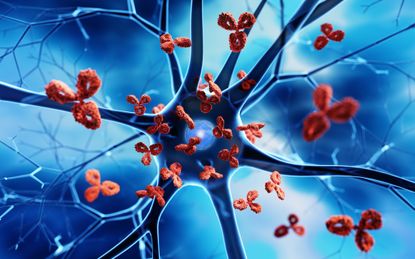'Inverse vaccine' shows promise treating MS, other autoimmune diseases
New research effectively cured mice of multiple sclerosis–type symptoms. Could this work in humans?


A free daily digest of the biggest news stories of the day - and the best features from our website
Thank you for signing up to TheWeek. You will receive a verification email shortly.
There was a problem. Please refresh the page and try again.
Researchers at the University of Chicago completely reversed a multiple sclerosis–type autoimmune disorder in mice, using a new technique that tricked the liver into neutering a specific immune response, the team reported in the journal Nature Biomedical Engineering. Current treatments for autoimmune diseases suppress the entire immune system, making patients more susceptible to infections.
A body's protective T cells attack antigens, or molecules and molecule fragments, usually harmful viruses or bacteria. But with autoimmune diseases, the T cells attack a body's own healthy molecules, called self-antigens, Science explained. The University of Chicago team found that by attaching a sugar protein, N-acetylgalactosamine (pGal), to the self-antigen under assault, they could send it to the liver, which would teach the immune system to tolerate the molecule.
"Rather than rev up immunity as with a vaccine, we can tamp it down in a very specific way with an inverse vaccine," lead author Jeffrey Hubbell said in a statement. The hope is that these "inverse vaccines" will prove effective at treating MS, lupus, Type I diabetes, rheumatoid arthritis, myasthenia gravis and other befuddling autoimmune disorders. A company Hubbell co-founded recently completed a phase 1 trial using this technique on people with celiac disease and has started a phase 2 trial.
Subscribe to The Week
Escape your echo chamber. Get the facts behind the news, plus analysis from multiple perspectives.

Sign up for The Week's Free Newsletters
From our morning news briefing to a weekly Good News Newsletter, get the best of The Week delivered directly to your inbox.
From our morning news briefing to a weekly Good News Newsletter, get the best of The Week delivered directly to your inbox.
Scientists not involved in the research said the findings are promising but cautioned that previous methods for calming a body's immune response to self-antigens had come up short when moving from animal testing to human trials.
The paper is "a strong piece of work," introducing "a cool new way" to teach the body's defenses to stop attacking healthy tissue, Stanford Medicine neuroimmunologist Lawrence Steinman told Science. Whether this approach ultimately proves effective in humans, he added, "I hope that someday somebody is going to get it right and change the world."

Continue reading for free
We hope you're enjoying The Week's refreshingly open-minded journalism.
Subscribed to The Week? Register your account with the same email as your subscription.
Sign up to our 10 Things You Need to Know Today newsletter
A free daily digest of the biggest news stories of the day - and the best features from our website
Peter Weber is a senior editor at TheWeek.com, and has handled the editorial night shift since the website launched in 2008. A graduate of Northwestern University, Peter has worked at Facts on File and The New York Times Magazine. He speaks Spanish and Italian and plays bass and rhythm cello in an Austin rock band. Follow him on Twitter.
-
 Ben Fountain's 6 favorite books about Haiti
Ben Fountain's 6 favorite books about HaitiFeature The award-winning author recommends works by Marie Vieux-Chauvet, Katherine Dunham and more
By The Week Staff Published
-
 6 picturesque homes in apartments abroad
6 picturesque homes in apartments abroadFeature Featuring a wall of windows in Costa Rica and a luxury department store-turned-home in New Zealand
By The Week Staff Published
-
 Why 2023 has been the year of strikes and labor movements
Why 2023 has been the year of strikes and labor movementsThe Explainer From Hollywood to auto factories, workers are taking to the picket lines
By Justin Klawans Published
-
 Antimatter isn't immune to gravity, landmark experiment confirms
Antimatter isn't immune to gravity, landmark experiment confirmsSpeed Read Antimatter is the mysterious evil twin of matter, but new research proves they do have something fundamental in common
By Peter Weber Published
-
 Air pollution is now the 'greatest external threat' to life expectancy
Air pollution is now the 'greatest external threat' to life expectancySpeed Read Climate change is worsening air quality globally, and there could be deadly consequences
By Devika Rao Published
-
 How Antarctica has become the enduring climate change bellwether
How Antarctica has become the enduring climate change bellwetherThe Explainer Despite its remote location, the southernmost continent is stricken with climate change issues
By Justin Klawans Published
-
 NASA fully restores contact with Voyager 2 spacecraft
NASA fully restores contact with Voyager 2 spacecraftSpeed Read
By Justin Klawans Published
-
 'Extremely dangerous heat wave' to scorch parts of US
'Extremely dangerous heat wave' to scorch parts of USSpeed Read
By Justin Klawans Published
-
 Are shark attacks really on the rise?
Are shark attacks really on the rise?The Explainer Reports of shark sightings across U.S. beaches continue to make headlines
By Justin Klawans Published
-
 Brain disease linked to head injuries diagnosed in female athlete for first time
Brain disease linked to head injuries diagnosed in female athlete for first timeSpeed Read
By Justin Klawans Published
-
 Scientists find evidence of gravitational waves warping space-time throughout the cosmos
Scientists find evidence of gravitational waves warping space-time throughout the cosmosSpeed Read
By Peter Weber Published










